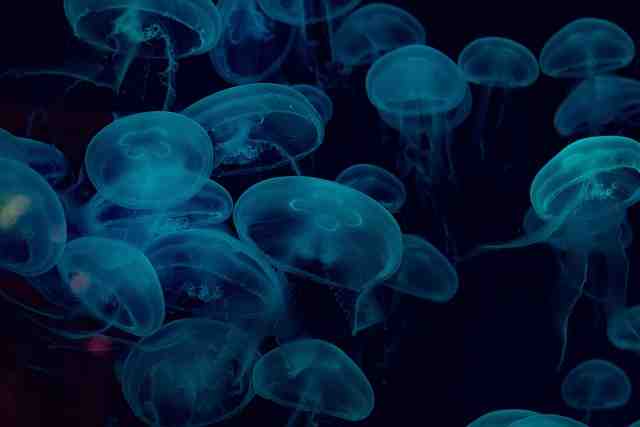Do Jellyfish Feel Pain (EXPLAINED)
Jellyfish are notorious for their many beautiful colors and patterns. I personally think they are some of the coolest animals, especially among marines. They are as small as they can get and have one of the simplest body structures.
They do not have brains, bones, hearts, and even eyes. In fact, no blood is found in their body. But despite how simple their bodies are, it’s not always clear how their internals work. For instance, in the absence of a brain, it is not exactly clear how they process pain or if they even experience it in the first place.

Do Jellyfish Feel Pain?
Jellyfish have a basic network of neurons. These neurons only help them with basic survival needs. They do not feel pain as humans do.
The neurons consist of a mesh of nerve cells distributed all over their body, which makes them sensitive to touch. As a result, they are able to react to nociceptive stimuli. For instance, they can sting you in defense if you swim against or touch them.
Having said that, nociception is not the same thing as pain. So, while jellyfish can sense their environment, there’s no evidence that suggests they experience actual pain when exposed to a noxious stimulus or even tissue damage.
Do Jellyfish Know They Are Alive?
Jellyfish don’t know they are alive. The absence of a brain means they lack consciousness. In other words, they don’t know they exist.
Their awareness of their surroundings mainly comes from sensory perception, like touch.
They have no perception of whether they are alive or not. In fact, most of what they know about their surroundings comes from messages they get from sensory perception, like touch. This is because they have a very simple nervous system and lack the cognitive complexity of humans. In fact, their swimming is based on instincts and perception of their environment.
Do Jellyfish Feel Emotions?
No, jellyfish don’t feel emotions. As earlier indicated, they have a very simple nerve system consisting of ganglions. These ganglions do not have the capability to “feel” or process the complex experience of pleasure or pain.
Unlike humans, they lack endorphins or amygdala, which are structures required to feel emotions such as pain, fear, love, or anger. So, while they may exhibit some tendencies that seem emotional, Jellyfish do not have emotions. Their movements and reactions are purely instinctual and reflexive.
Do Jellyfish Feel Love?
The absence of a brain and a heart means a jellyfish lacks the ability to feel love or demonstrate any form of friendliness. As earlier indicated, they only possess a nervous system and a digestive system which allow them to respond to stimuli and feed.
This means that a jellyfish picks its mating partner based on natural instinct. The males pick up pheromone cues from the females and engage in mass spawning. They do not form attachments or bonds with the females or other jellyfish.
While some jellyfish can be seen to exist in groups known as smack or blooms, they do so as a means of survival. It is not because they love each other!
Do Jellyfish Have Brains?
Jellyfish lack a brain in the traditional sense. They also lack a central nervous system.
They have a system of nerves called a nerve net (or a basic network of nerves) that is spread across their bodies. It makes them able to sense their environment.
The nerve net has a concentrated network called a nerve ring present in the head. This acts as a brain but is not a brain in the real sense. It acts as a center for processing sensory information.
Can Jellyfish Be Happy?
It might not be very possible to say a jellyfish is happy. Happiness to a jellyfish is not an emotional feeling. However, there are many ways to know a jellyfish is in a healthy, “happy” condition. This can be related in some ways to happiness.
Jellyfish are capable of showing signs of stress. These signs help jellyfish keepers to know when their jellyfish are not thriving in certain conditions. Some of these signs include a clear bell/head, fine tentacles, untangled tentacles, etc.
How Is Pain Measured in Jellyfish?
Jellyfish do not have a central nervous system like vertebrates. The central nervous system in vertebrates is the part that translates messages into sensations. A jellyfish does not have that. Most scientists are of the opinion that it means they do not feel any conscious sensation, including pain.
The nervous system of a jellyfish is mostly made of a nerve net (or diffuse nerve net) and a nervous condensation in their bell called the nerve ring. The major function of the nerve net’s neurons is motor coordination. It controls things like movement and reflexes.
The nerve net elongates from the bell and terminates at the tentacles as sensory receptors. These receptors come in contact with stimuli and induce some chemical messengers in the neurons to the nerve ring. This message relay triggers a motor movement which can be towards or away from the stimuli. They react to different stimuli and are able to escape predators like bigger fishes and squids via this simple process.
This process is the same for all types of stimuli, including harmful stimuli like predators, being stabbed by a fisherman’s spear, or changes in water quality. That said, scientists have been observing this behavior to ascertain if a jellyfish’s reaction is due to the fact that it felt the pain as a sensation. Since they lack nociceptors which are critical for an organism to be able to consciously feel pain, their reaction to harmful stimuli can be said to be due to instincts.
Conclusion: Do Jellyfish Feel Pain?
To conclude, jellyfish don’t experience complex emotions and feelings like pain. They also do not feel love and fear. This is because, unlike humans, they do not possess a brain. Pain is an output of the brain, and it results from input coming from distant receptors.
Besides a brain, jellyfish also don’t have a heart, bones, or respiratory system. Their entire body consists of water and a simple neural network which enables them to sense their surroundings. In other words, they can respond to touch, but this doesn’t mean they feel pain the way humans do.






